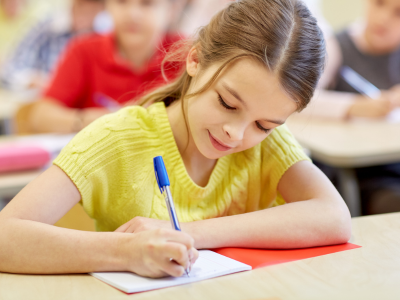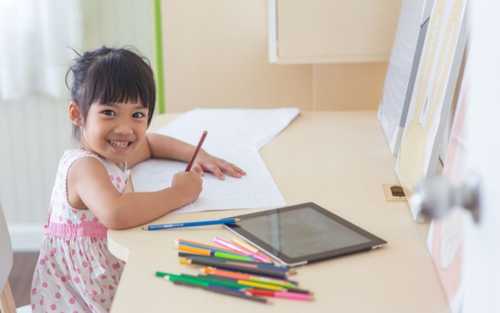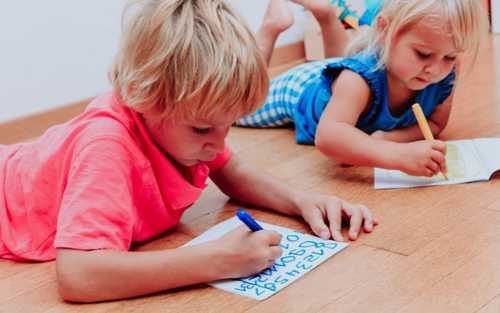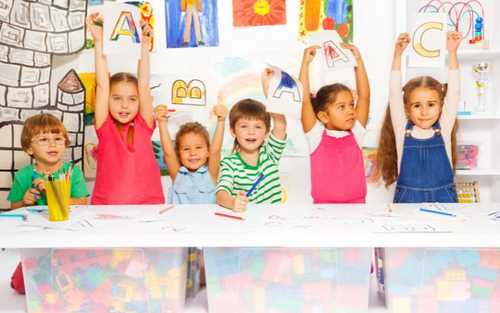How Creative Writing Improves Children's Wellbeing


As children grow up, they experience a lot of changes, like learning new information at school, making new friends, and learning about the world around them. All of these changes can be confusing and overwhelming which can affect your child’s wellbeing. To help your child navigate these changes, it is important to support your child’s mental health to keep them happy.
Recent studies suggest that creative activities, including creative writing, help children develop self-esteem, mindfulness, feelings of achievement, empowerment, and empathy.
Creative writing is a fantastic way for children to explore their imaginations and process their feelings. When your child learns how to communicate using their own voice, they will feel happy and confident.
Keep reading to learn how you can make a positive impact on your child’s mental wellbeing by learning more about the benefits of creative writing!

Practice Mindfulness By Journaling
When we write creatively, we become more mindful of our feelings, thoughts, and surroundings. This is important for your child’s wellbeing because it can lower anxiety, increase self-awareness, and teach children how to be kinder toward themselves.
Keeping a journal is a great way to teach your child about mindfulness because they can learn how to process what happened during the day, how they felt, and how it impacted them. Processing emotions and experiences through different writing activities works as a grounding exercise since it allows your child to hold space for their feelings while learning to let go. Journaling provides a safe space where children can learn more about themselves because it is a creative outlet built for self-expression and reflection.
Here are some journaling prompts to help your child get started:
- Write about your day. What was the best thing about your day? What was something hard that you experienced?
- What is something that you are really proud of? Write about how you accomplished this and why it is important to you.
- What is something that you want to change about your day? What would you do differently and why?
Short Story Writing Helps Build Feelings of Achievement
Just like any project, starting a short story is a wonderful opportunity for children to explore their creativity. A short story is a great introduction to inspire children to start writing longer works while giving them the freedom to create their own worlds. It inspires children to explore their own ideas while learning how to communicate which helps build their confidence. When your child has more confidence in themselves, they will feel more secure and their wellbeing will increase!
Short story writing can be a challenging genre. Story writing can take longer to write because of character and world building. This means there needs to be a greater focus on sentence structure where children need to learn how to clearly communicate with their readers. The genre also requires more planning which will help your child learn how to work through different problems and solutions. As your child works through these challenges, they will feel a great sense of achievement which will help develop self-confidence and increase their wellbeing! When we feel proud and happy about the things that we are accomplishing, we feel more comfortable with who we are.
Help your child get started with these short story prompts:
- Write a story about an animal that is trapped in a zoo and is trying to find a way back to its family in the wild.
- Write a story about a superhero who is saving a city from a falling star.
- Write a short story about a group of friends that are going on an adventure to find a powerful jewel.
Finding Their Voice By Playwriting
Developing your child’s unique writing voice is important not only in their education but for their mental wellbeing. Children need to learn how to express their experiences and feelings using their own words.
Playwriting can be an effective way for children to practice these communication skills while finding their own voice. By writing down a conversation between two different characters, your child can learn to recognize how people communicate with one another while learning how to speak for themselves.
Since the genre centers on dialogue, it can also act as an escape for children who are frustrated when they feel misunderstood. Some children have difficulties communicating with others and standing up for themselves verbally. Playwriting acts as a creative escape where children can practice conversations and they can fully see the power behind their own voices. Practicing conversational skills in writing increases self-confidence which positively impacts their emotional wellbeing as they create their own identity.
Here are some playwriting prompts to get your child started:
- Write a play about two mice that are fighting over a giant cookie. Each one thinks that they deserve the entire cookie and can’t understand why the other is trying to steal it.
- Write a play about someone who is hiding a secret from their best friend.
- Write a play set in an enchanted garden where the flowers are as tall as trees and there are talking animals everywhere. How are you going to get home? Include the following characters: a very pretty butterfly, a confused bird, and a serious rabbit.
Use Poetry to Build Empathy
Empathy is a skill that helps us identify and understand others' emotions, feelings, and reactions. It is a difficult skill to learn but it helps us build relationships with others which increases your child’s mental wellbeing.
Poetry can help your child learn more about mindfulness and empathy. By writing a poem about their emotions, children can reflect while learning how to let go of their feelings. Since poems have restrictions on line length, it will also challenge your child to select the best words to clearly show those emotions. Using figurative language in poetry, like similes and metaphors, allows children to process feelings in a new way which helps them learn about empathy as they connect emotions to other ideas. The unique form of poetry will help your child understand how to express their feelings and recognize how others have those same feelings.
Here are some ideas to get your child started with writing a poem:
- Write a poem about a leaf that is being pushed around by the breeze. Is the leaf having a good time or is he upset? Explain how he might be feeling.
- Write a poem about a rainy day. How does it make you feel?
- Write a poem about the summer. What feelings are associated with summer?
Writing Letters to Build Relationships
Writing letters is a great way for your child to learn how to communicate with others. Letter writing helps children to organize their thoughts, experiences, and emotions in a way that makes sense to them and others. This allows them to process their feelings logically, develop emotional intelligence, and improve their wellbeing. Sometimes children have trouble finding the right words to talk about their day when they are asked. Giving them the chance to write down these emotions can organize those thoughts in a helpful way.
Another benefit of writing letters is that it can strengthen your child’s relationship with relatives and friends that are far away. Keeping in touch with separated family and friends can be hard, but writing letters can keep us connected! Being connected with those we love also increases our happiness and feelings of belonging. Plus, the surprise of getting a letter in the mail is always a fun reward that will encourage your child to keep writing!
Here are some letter writing prompts to get your child started:
- Write a letter to a family member telling them about something that happened during school.
- Write a letter to a friend telling them all about the last vacation that you had.
- Write a letter to a friend or family member explaining your favorite ice cream flavor and why they need to try it.
Write a Gratitude List Every Day as a Grounding Technique
Sometimes it’s easy for us to focus on the negatives, which is why teaching your child about gratitude can do wonders for their wellbeing! Learning to recognize the positive moments in your child’s day will help them become more mindful, and change their perspective.
A quick activity that you can add to your everyday routine is writing a gratitude list. This can look like a bullet point list or a small paragraph but the idea is that your child is writing down something that they are grateful for.
It is a wonderful grounding exercise to help with anxiety, sadness, or stress since it redirects their minds to focus on the here and now. When they look back at their lists, they will be reminded of all of the things which can lift their mood.
A way to start helping your child with their gratitude list is to challenge your child to write down three things every day that they are grateful for. Remind them that it can be anything big or small like “I am grateful that I got to play with my friend today” or “I am grateful for the sunshine keeping me warm”. Even if your child has a bad day, still challenge them to write something down.

Conclusion
All these forms of creative writing are great tools to help strengthen your child’s wellbeing while they learn how to be better writers. Creative writing has been shown to positively impact children’s lives while providing vital support to their mental wellbeing. Children’s wellbeing is important to understand and help maintain since it will keep your child happy and healthy!

Our writing program for kids offers a supportive community that encourages young writers in a fantastically fun way!
Sign up today and get a FREE 7-day trial.
Got any questions? Reach out to us by email at support@nightzookeeper.com. Let us know if any of these tips worked for you by reaching out to us on our social media!
For more information on how creative writing and other creative activities impact your child’s wellbeing, please refer to the sources below:
- Creative Art: Connection to Health and Wellbeing, November 2022.
- Using Imagination, Mindful Play and Creative Thinking to Support Wellbeing and Resilience in Children, February 2022.
- Poetry and Story Therapy: The Healing Power of Creative Expression, December 2011.
- Family Work, Creativity, and Wellbeing, February 2018.


Make Reading & Writing Fantastically Fun!
- Award-winning reading & writing program for kids
- Improves spelling, grammar, punctuation & vocabulary
- Over 1,000 different learning games and activities


How To Get Your Child To Love Writing


Top 7 Writing Activities For Kids


Literacy Games For Kids


